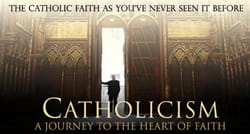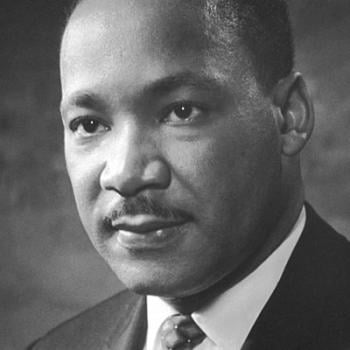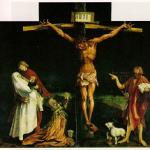 Fr. Robert Barron's Catholicism is a few things. It's a cultural response to our challenges as Catholics, as Catholics in a society. It's a reintroduction for someone who has fallen away, for a culture that has. It's a catechism of sorts for those who did not grow up memorizing the Baltimore Catechism, or reading any. It's a starting point. It's a launching pad.
Fr. Robert Barron's Catholicism is a few things. It's a cultural response to our challenges as Catholics, as Catholics in a society. It's a reintroduction for someone who has fallen away, for a culture that has. It's a catechism of sorts for those who did not grow up memorizing the Baltimore Catechism, or reading any. It's a starting point. It's a launching pad.
It's an invitation.
One of the saddest of sights, to me, is a locked door on a Catholic Church. Mercifully, I find them infrequently. And, all over the world—and all over this country—you can find open doors to the Blessed Sacrament at all hours.
Catholicism is an open door, and fittingly, that's the image on Fr. Barron's book cover. Welcome home. The light is on. It's by the Blessed Sacrament during confession hours. There is mercy and sustenance here. There is everything you ever wanted or needed and everything you feel you don't deserve. Christ thirsts for you. Go to Him.
It's an open door that takes you into different corridors that ultimately all emanate from and lead to the Eucharist.
What was initially fascinating to me—indication of something of a minor miracle—was that PBS would pick up the associated documentary miniseries Fr. Barron and Word on Fire put together. It speaks to the high production value—it's good TV!—but it is, of course, much more than that. In the book, Fr. Barron writes that "Catholicism is a celebration, in words and imagery, of the God who takes infinite delight in bringing human beings to fullness of life." And this is what Fr. Barron does with his book and series: he celebrates it. He brings the viewer into the love for which he has surrendered his life, and everyday—as we are all called to in our different vocations—so that others too may see and live the life Christ calls us all to.
Catholicism—like the faith itself—is an invitation to encounter and live life united to the Incarnation. Right there on your bookshelf. As Fr. Barron puts it: "I am not interest in showing you the artifacts of Catholicism as though they were dusty objets d'art in a museum of culture. I want to function rather as a mystagogue, conducting you ever deeper into the mystery of the Incarnation of the hopes that you might be transformed by its power."
The author, a father and a herald, writes: "Paul consistently proclaimed that the church of Jesus Christ is not so much an organization as an organism, a mystical body. I will present the church accordingly as a living thing, whose purpose is to gather the whole world into the praise of God."
He reminds us: "The entire purpose of the Liturgy and the church is to make saints, to make people holy."
And so while showing you the creations of men seeking to glorify God, he introduces you to the minds and prayers and lives of men and women who you may not truly know. Therese of Lisieux and Katherine Drexel, both "within a few years of each other," leaving an audience with Leo XIII in tears. What was that about, who were they about? The lady from the postal stamp, Mother Teresa—who also we know from pictures with Princess Di and Hillary Clinton—but whose complete image is of one "elevated ... transfigured." By Christ. Whose life demonstrated "a disciplining of the desires that goes far beyond the requirements of justice so as to serve the infinite demand of life."
Every time I see a Che t-shirt—it was a purse the other day at Starbucks—I wish it was instead an image of Mother Teresa, but with Fr. Barron's description, now: A revolutionary figure of love. Knowing His thirst for her . . . even when it all seemed dark.
And here, too, Fr. Barron provides a counter to the story in the headlines. When the world focused on her recently-revealed dark night, it became translated into all kinds of things it was not. What it was, what she understood it as, was a participation in the Passion, a most intimate union with out Lord. "Feeling the absence of God, Mother Teresa entered even more fully into the suffering of those she longs to serve, the poorest of the poor."




